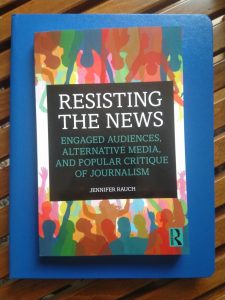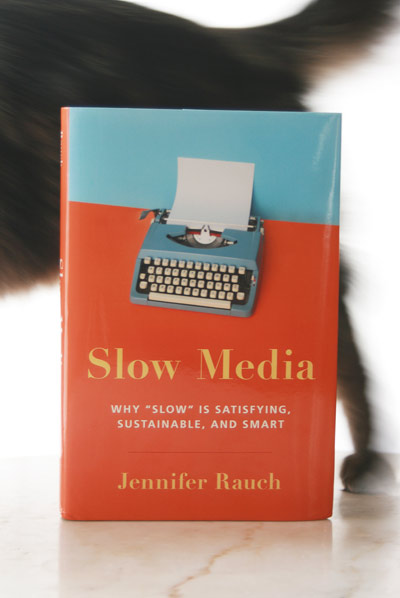BOOKS.
My book Resisting the News: Engaged Audiences, Alternative Media, and Popular Critique of Journalism (Routledge, 2021) looks at how audiences filter their interpretations of mainstream news through experiences with alternative media and political protest.
I use the concepts of ritual communication and interpretive communities to paint a layered portrait of the strategies through which liberal and conservative activists make sense of their news environments.
Drawing on a 15-year research project, this book illuminates popular critiques of news to offer a distinctive perspective on the problems of journalism today—and how to fix it.
- Winner of a Silver Nautilus Book Award.
- Finalist for a Marshall McLuhan Book Award.
My book Slow Media: Why Slow is Satisfying, Sustainable & Smart (Oxford University Press, 2018) examines innovative theories and practices that foster social and environmental sustainability in mediated life. It explains how proliferating media habits are tethered to an unsustainable growth paradigm that depletes human and ecological resources.
The Slow Food movement inspired people to apply principles like humanism, localism, simplicity, self-reliance and fairness to their use and production of media. Slow Media promotes alternatives to global, corporate media that are often unresponsive to the needs of human communities and natural environments. The Slow Journalism movement and the slogan “Good, Clean, Fair” offer an ethical framework for making the news industry more sustainable.
This book explores concepts such as Mindful Media, Green Media, and Post-Luddism. Mindful Media advocates for more contemplation in, and about, daily communication and technology use. It espouses practices like unplugging, monotasking, and sustained attention. Green Media seeks to reduce electronic waste and consumption of nonrenewable resources — debunking the myth that digital media are ecologically benign. Post-Luddism challenges the conventional wisdom that people skeptical of new technology are ignorant or afraid. Instead, it cultivates an informed, inclusive discussion about media’s socio–cultural impact.
SLOW MEDIA can help transform the way we produce and use media. It can propel conversations about how we can challenge the status quo — as users, consumers, and citizens. It can nurture a media ecosystem that is more satisfying for people and more sustainable for the planet.



